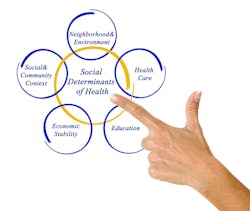The National Quality Forum (NQF) has released recommendations for healthcare organizations seeking to help patients address the non-medical factors impacting their health.
NQF’s Leadership Consortium, a group of healthcare experts and stakeholders, spent the past two years examining the issue, developing strategies, and then applying them in real-world healthcare settings to come up with a set of tested recommendations for navigating the complexities of leveraging SDOH data to improve health outcomes.
These recommendations are summarized in a new report, Social Drivers of Health Data Utilization: Integrating Healthcare and Community Services to Address Health-Related Social Needs.
Among the recommendations are:
• Leverage digital platforms to augment regional referral networks and resources with real-time information;
• Develop methods to include social needs information with healthcare services referrals; and
• Integrate data (e.g., SDOH, sexual orientation and gender identity [SOGI]) with referral processes to improve understanding of existing disparities and access to affirmative care.
“SDOH data hold great potential to broaden our approach to patient health and amplify improvements in health outcomes for patients confronting these everyday challenges” said Leadership Consortium Co-Chair Peter Angood, M.D., president and CEO of the American Association for Physician Leadership, in a statement. “We also understood very well that overcoming obstacles to effective utilization of SDOH data is an ambitious and complex undertaking, and we chose to focus on partnerships between healthcare providers and community-based organizations. These recommendations offer field-tested promising practices that have practical application in real-world care settings, as well and helpful existing resources that anyone can access.”
Members of the Leadership Consortium set out to find efficient and effective ways to leverage SDOH data to connect patients with helpful resources in their own communities and developed a set of initial recommendations. A subset of four member organizations then served as implementers to test the recommendations. The U.S. Department of Veterans Affairs (VA), the Case Management Society of America (CMSA), the Texas Health and Human Services Commission (Texas HHSC), and Phreesia evaluated the recommendations in diverse clinical settings across five projects.
Implementers shared their findings with the full Consortium, which then worked together to identify key lessons learned, barriers, resources, and outcomes. More information about each of the individual projects and their results can be found in the report along with final recommendations.
The report offers guidance on systematic ways to improve partnerships among patients, healthcare teams, community partners, and the broader healthcare community, leveraging digital platforms and streamlining multidirectional communications.
“Solving the technical challenges with sharing HSRN data across different IT systems with differing capabilities as well as standardizing this data are important steps in measurement, which will facilitate tracking of patient outcomes,” said Co-Chair Reena Duseja, M.D., M.S., senior advisor, Assistant Under Secretary for Health for Quality and Patient Safety for the Veterans Health Administration, in a statement. “Just as important if not more so, is prioritizing a solution that is patient-centered. We must maintain patients’ trust with this data, strive to capture outcomes that are important to patients, and co-create interventions that make the most sense for patients’ well-being.”
The report acknowledges the significant barriers to effective SDOH data collection and utilization, including financial and human resource availability, referral and communication workflow optimization, and data integration and interoperability. While these and other improvement opportunities remain to be addressed before the full potential of these data can be realized, the Consortium’s recommendations provide needed guidance and a meaningful starting point.


